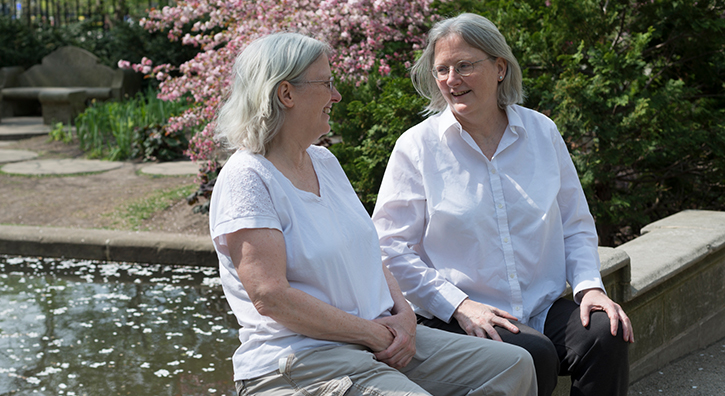
Laurie (left) and Lynne (right) at Botany Pond during one of Lynne’s frequent visits. (Photography by Nathan Keay)
Twins Laurie and Lynne Butler—one a UChicago chemistry professor, the other a double alumna—discuss math, horses, and a college boyfriend who never got them confused.
Laurie Butler earned a BS in chemistry from MIT and a PhD from UC Berkeley before joining the University of Chicago chemistry faculty. Her twin sister, Lynne Butler, AB’81, SM’13, earned a PhD from MIT before joining Princeton’s math faculty. She’s now a professor at Haverford College. Lynne returned to UChicago for a master’s in statistics “just for fun.” Laurie’s husband, Michael Stein, is a statistician at UChicago who started out in math.
The Core caught up with the sisters during one of their frequent—at times weekly—visits to see each other. Interview has been edited and adapted.
Was there a shared experience that led you both to STEM (science, technology, engineering, and math) fields?
Lynne: There was quite a gap between our four older siblings and the two of us. The boys, the girls, and the twins is how we usually say it. The oldest is 10 years older than me. The next is nine, next is eight, next is six, and then Laurie is four minutes older. When those four were in college, they would come back to Garden City for a visit—on Long Island where we lived at the time—and teach us stuff. I remember, even when they were in high school—especially my sister Debbie, who now lives in Africa, and my brother Bruce—they’d teach us cube roots when we were learning square roots.
Laurie: I always thought you had to be a medical doctor to do research, but our sister Sharon went to New College of Florida and taught us what a PhD was.
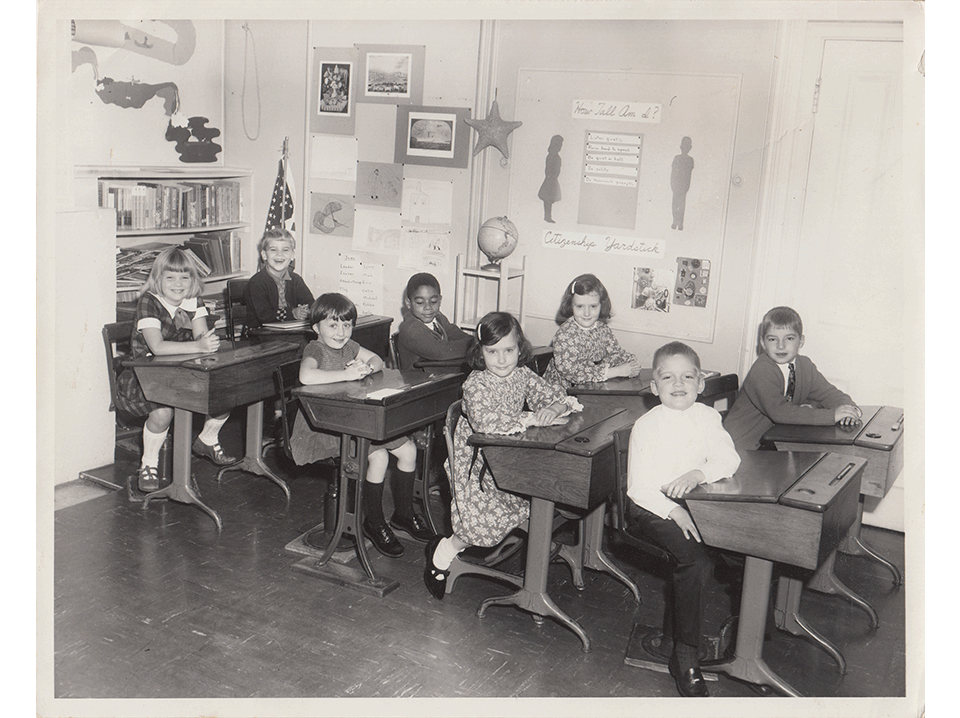
So all of the siblings were focused on education?
Lynne: The top four were not education oriented.
Laurie: Sharon was eventually.
Lynne: She was the second time around. When my father wrote his will, he left money for Laurie’s and my education but not for further education for the other siblings. He was mad at them for wasting their college opportunity.
Laurie: I didn’t know that. Our mother was a nurse, and our father was a doctor. Dad used to say, “You’ll never get a job in humanities.” He was worried about making a living, but he loved literature. He wrote a novel himself and used to pick on our older siblings, saying that Robert Louis Stevenson wrote this poem when he was 14, and what have they done?
Lynne: He was born in 1908, so he experienced the Depression. That stayed with him. And my mother came from a farming family—raised by her grandparents in upstate New York.
Lynne, what got you interested in math? Laurie, why chemistry?
Laurie: Probably that high-school math teacher. We went to high school in St. Petersburg, Florida, where we moved after our father had a stroke and the family needed to save some money.
Lynne: Yeah, Mr. Mead, who studied with me. He wanted to learn group theory, and so did I, so we learned together.
Laurie: But when he was teaching linear algebra, I was like, I don’t care. I don’t get this. Now I love linear algebra. But something about how he taught it.
Lynne: He taught linear algebra as a pure math subject rather than its incredibly rich, important applications. I was fine with that at the time, but now I see how for the vast majority of students, that was the wrong approach. He alienated my dearest sister! Otherwise we might have been mathematicians together.
Laurie: I went to Johns Hopkins for one year before MIT, and I remember trying to pick what science to do. I was going to major in molecular biology and thought neuroscience would be cool. At the library I opened an issue of the Journal of Neuroscience. I read the experimental section of the first article, and it started with, “We used the heads of a thousand cats.” [Slaps hands together.] I’m out of there! So I switched to chemistry.
Lynne: Laurie’s loved animals from when she was really little.
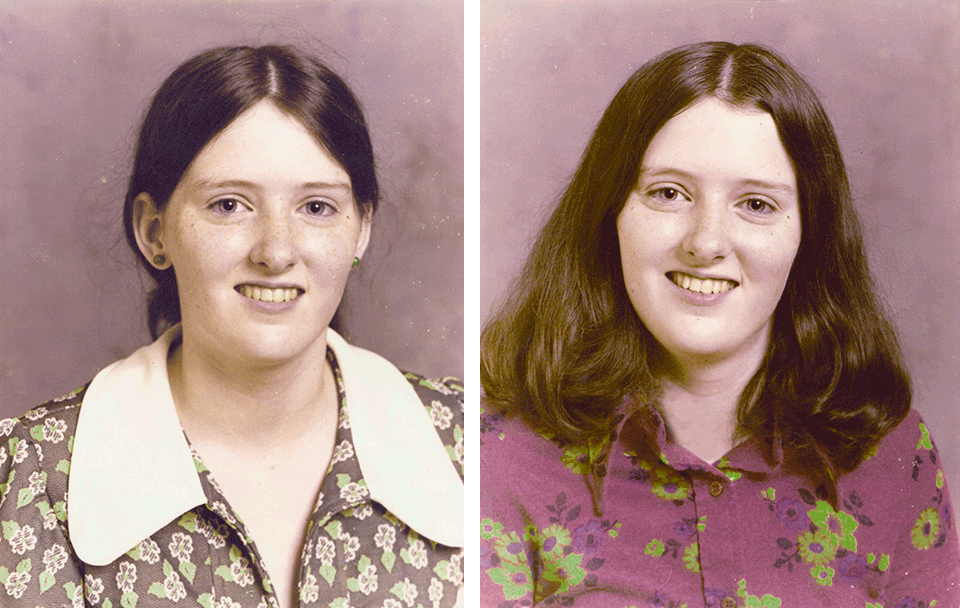
You have UChicago and MIT in common, though at different times. Did you choose your postcollege paths because of the other’s experience?
Lynne: Both of us knew from the very beginning that we would have to take our best offer at every decision point to be successful. But there was something fun that happened—
Laurie: The MIT transition.
Lynne: I was about to start at MIT and Laurie was finishing there, heading off to Berkeley. So people saw her in the spring and me in the fall. A lot of people said hello to me that I didn’t know.
Laurie: They were wondering why I was spending a fifth year at MIT.
Did you play along?
Lynne: There’s what they call the Infinite Corridor at MIT. Once, I was about a quarter of the way down, and someone was coming from the other direction, and we were still quite distant, maybe 40 yards apart. He was looking at me, so I knew it was coming. I preemptively said, “I’m actually not Laurie, I’m Lynne, her twin sister.” The guy did not know Laurie—was totally mystified why I was launching into this explanation.
Laurie: But when I visit Haverford, where everyone stops to chat, I just walk right by. I’m a little quiet.
Lynne: People would come to me the next day and say, “Lynne, did I say something wrong?” Oh no, Laurie’s visiting.
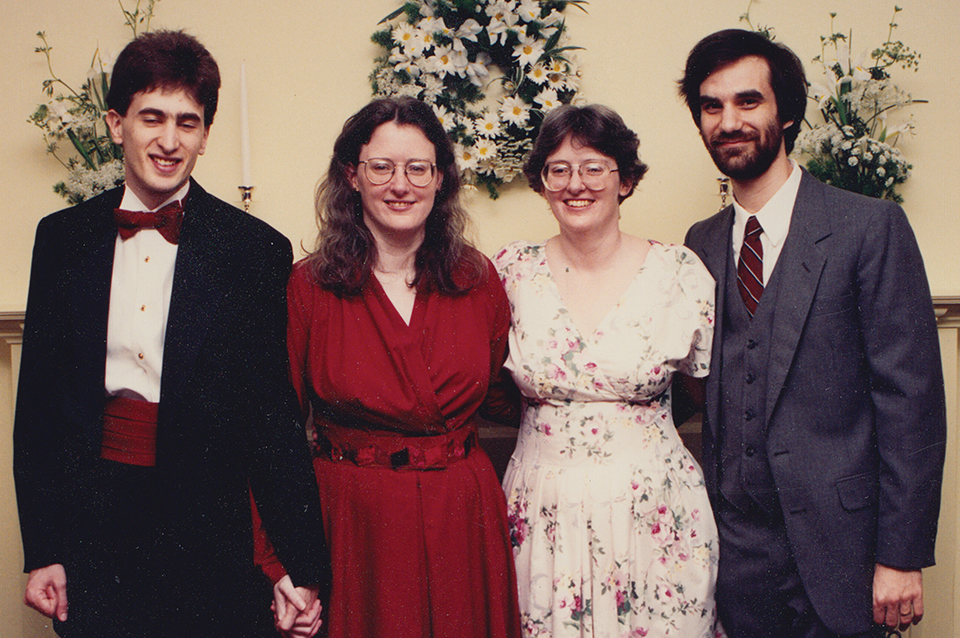
Can you describe your specific work?
Lynne: I was first interested in topology, but there was quite a bit of sexism in that field. My first graduate dissertation adviser at MIT was an algebraic topologist, who the other graduate student women warned me against. He would ask, “Do you plan to get married? Do you plan to have children?” And if you said yes, he’d say, “Then you shouldn’t be in mathematics.”
Laurie: But the guys could have children.
Lynne: At that point in my life, I didn’t want children, and I wasn’t interested in getting married, so I felt like it would be fine. That was a mistake. Our relationship really deteriorated when, during one of our 6 a.m. meetings—which is when he insisted on meeting me every morning—I commented on a stack of papers on his desk. I thought it must be his most recent publication and was hoping that if I mentioned it, he would offer me one. Instead he reported me to the chair for “intruding on his space.” The guy was really odd. But because there were only three topologists, he would be asked about me when I applied for jobs whether or not I was his student. The chair told me, “You can’t stay in topology.” So I switched to combinatorics and loved it.
Sorry, combina-what?
Lynne: Combinatorics. Counting. When you’re a student in grade school, you count subsets of a set. For my thesis, I counted subgroups of a group. It was algebraic combinatorics—the algebra came from group theory and the combinatorics came from the counting. It was a very hot field at the time. My original adviser’s students were getting jobs in North Dakota. My first job was at Princeton.
Laurie: It was like getting into nanomaterials 20 years ago.
Lynne: But after 20 years I got bored. I taught a freshman class that was half calculus and half probability theory, and women did much better on the application material. I thought, if I want to attract women to STEM, I should learn statistics. At Princeton I was the only woman out of 56 math faculty members. So this is a driver for me.
Laurie: They used to give her photocopying in the elevator because they thought she was a secretary. I had it easier. Well, there was one sexist thing. I wanted to work with Yuan Lee; he had not yet won the Nobel Prize, and he was on faculty at Berkeley. When I visited the Lee group, it was a friendly crowd. I was still an MIT undergrad, so I was used to a largely male crowd. The students took me out for pizza, and one physicist in the group said, “The Lee group is no place for women.” But Yuan was really great.
I did photodissociation experiments—dissociating molecules by letting them absorb light and trying to understand what products they make. And then I moved to Chicago and fretted about breakdown of the Born-Oppenheimer approximation—the assertion that nuclear and electronic motion can be separated.
Lynne: Laurie’s work on the Born-Oppenheimer approximation was quite groundbreaking, and the chemists at my little college knew about it. So I get some mileage at my school for having a famous twin.
Laurie: We get to use the other one as collateral. When theoretical physical chemists say they’re better than experimentalists, I can say, well, my sister’s a pure mathematician.
Lynne: If anyone had any prejudices, we would be able to defeat them right off the bat. They’d say to me, you’re a Princeton mathematician—you can’t have children. And I can say, my twin sister has a child, and she’s at the University of Chicago.
Laurie: Of course Mike did most of the work. My husband and I were married a long time before we decided to have a kid. We got married when I was 24, and I was 34 before I got pregnant. We had never really talked about having kids, but Mike’s a statistician, so he was slowly working on me, saying things like, “Surveys show that people say the best time of their lives was when their kids were little.” So finally I got the hint. So I said, if I take care of the first nine months, for obvious reasons, and you take care of the next nine years, I’m with you. He didn’t quite agree to that; he said I ought to be involved. But he was a really good parent. He’s since given talks to women scientists, and he tells them that they’ve got to marry the right guy.
Lynne: To be successful, I think that’s right. I always tell people that I don’t have to have children because genetically, Laurie’s daughter, Ellyn [Butler, LAB’13], is just as much mine as hers.
Laurie: And Ellyn pointed out maybe more because of mutations.
Laurie’s colleague Chuan He has said about his work on epigenetics that DNA sequence accounts for only so much of who you are, that environment can change your genetics. Does that affect your identity as twins—that you might not actually be identical at the molecular level?
Lynne: Well, you’re moving through your early years in exactly the same environment. People don’t bother distinguishing you for quite a long time.
Laurie: Like our father. He was very busy, so we were just “the twins.”
Lynne: We intentionally diverged in high school and were already quite different, but people were still confusing us. I wore dresses and Laurie wore pants, but people forgot which one wore what. We deliberately went to different colleges. We missed each other terribly but wanted people to know us as separate individuals.
Laurie: What did that one clerk ask us? How do you know that you’re Laurie? I used to fool my classes.
There are a few things in physical chemistry that are math-y, so once in a while when Lynne was visiting I’d send her in to lecture. And then I’d walk in. I told them it’s really important when you are a young professor to be able to work double time.
Lynne: We also tried to fool my boyfriend when I was in college here. We had him sit on a couch, the two of us were behind him, and randomly one or the other of us would reach forward and shake his hand. Every single time he guessed correctly. I asked how, and he said, “You squeeze back.”
Laurie: She has a very unusual husband now. Miller [Maley] went to college at 12 and had one of his two PhDs by the time he was 20.
Lynne: As the only woman on Princeton’s math faculty, I had my pick! But I picked him from computer science.
Laurie, you’re working part time now and planning a move. What prompted that change?
Laurie: Six years ago I had bilateral breast cancer. It made me think carefully about the amount of time I was spending at work versus with family. So reducing my workload meant I could take my daughter to flute auditions at different colleges. Mike would normally shoulder that sort of thing. It also reminded me of a promise to myself to move east.
That’s when I decided to move in with Lynne. It’s hard because I’ve been ready to go for a long time, but Mike’s also a faculty member here and master of the Physical Sciences Collegiate Division. And we’d have lost an enormous amount of tuition benefit for our daughter. So we made a deal that when I turned 59, I would be there [at Lynne’s home in New Jersey]. Mike has a sabbatical in 2018–19, so I’m moving in one year, and Mike will come a couple of months later.
Lynne: They’re not promising to stay forever—just for a year to see how they like it. I plan way ahead. When we bought our house in 1997, I was looking for a place with a first-floor master bedroom because I knew I wanted to die in that house—
Laurie: She likes talking about dying in that house.
Lynne: We got a very large house. Even though it’s just me, my husband, and our brother who lives in the basement, I knew I wanted Laurie and her husband to move in with me eventually. I’m glad it’s finally happening.
Laurie: You haven’t let me forget it! She planted the seed and then nurtured it!
You’re already showing your home. Where will you stay if it sells quickly?
Laurie: We have a place in Crete, Illinois, a tiny town next to Beecher where our two horses are. We’ve been walking to work and driving to the horses on the weekend; we would reverse that.
[Laurie pulls up a photo of the two of them with her horse Colors.]
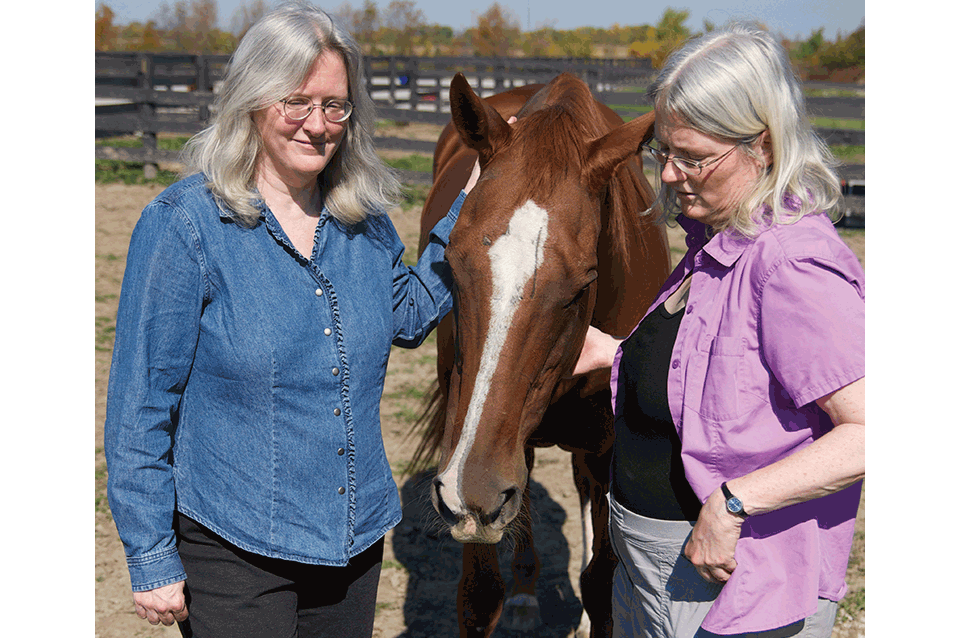
Lynne: She’s a descendant of Northern Dancer.
Laurie: She was bred to be a racer in Kentucky but had an accident early on. The other one is Lucky. He’s a real snot.
You’re taking veterinary technician classes now, right Laurie?
Laurie: Yes, at a little college near Lynne. They have a practicum at the New Bolton Center, where racehorses are treated. That’s what attracted me to the program.
Do you want to get a job in vet tech? Or is this for retirement?
Lynne: Laurie wants to work with horses; she doesn’t care whether or not she gets paid. She also likes being a student again.
Laurie: It’s time to do good deeds.
